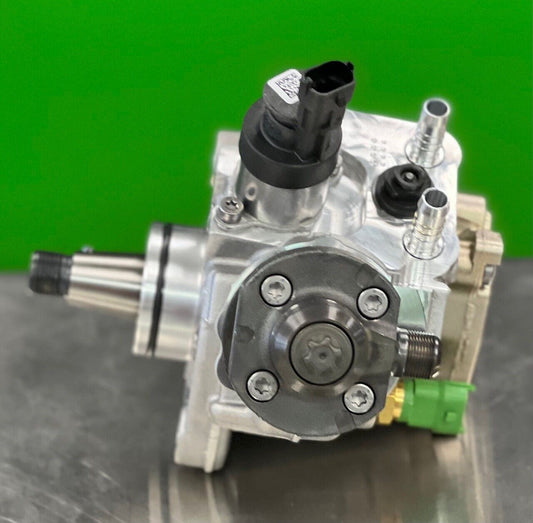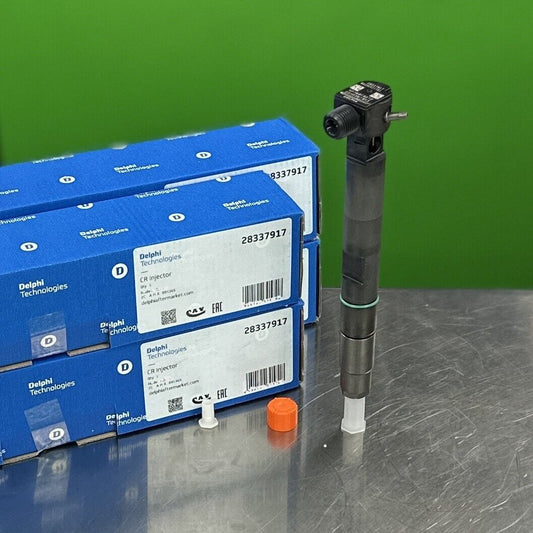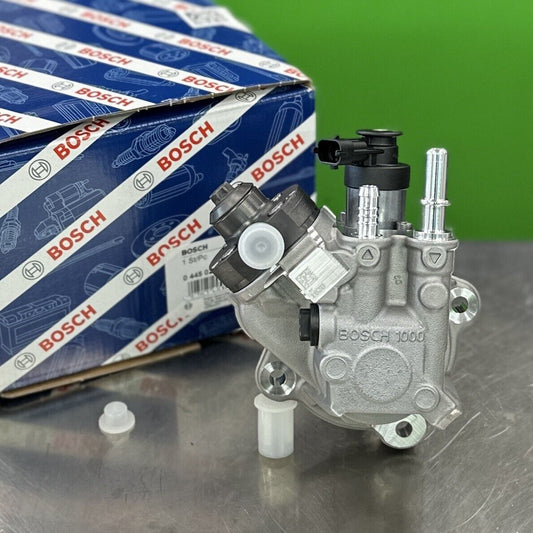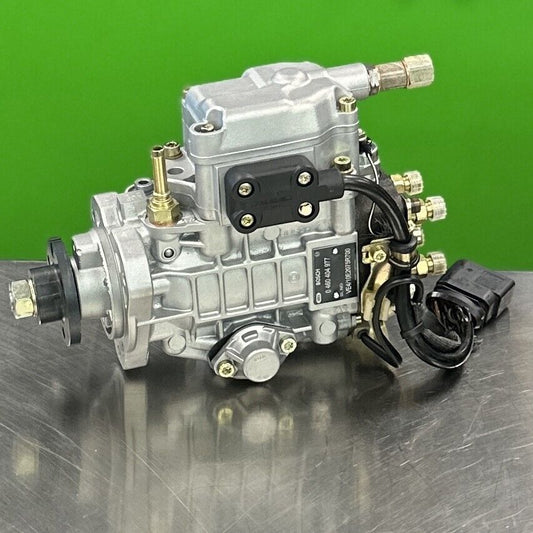10 Signs Your Fuel Injector Needs Replacement
Learn about the common indicators that suggest your vehicle's fuel injector may need to be replaced to maintain optimal engine performance and fuel efficiency.
If you experience frequent engine misfires or rough idling, it could be a sign that your fuel injector is clogged or not functioning properly.
A decrease in fuel efficiency could indicate a fuel injector issue, causing the engine to work harder and consume more fuel than necessary.
Frequent engine stalling or hesitation during acceleration may be a result of a faulty fuel injector that is not delivering the right amount of fuel.
If your vehicle's check engine light is illuminated, it could be a sign of various issues, including a malfunctioning fuel injector that needs attention.
A strong smell of gasoline inside or outside the vehicle could indicate a fuel leak from a damaged or leaking fuel injector.
1. Engine Misfires
Engine misfires can be a frustrating issue for any vehicle owner. When your engine misfires, it's like a symphony conductor missing a beat – the harmony of your engine's performance is disrupted. This hiccup in the engine's rhythm can be a clear indication that your fuel injector is not functioning as it should. Imagine your engine as a finely tuned orchestra, with each fuel injector playing a crucial role in the symphony of combustion. If one injector is off-key, the entire performance suffers.
One of the key signs that your fuel injector may need replacement is frequent engine misfires or rough idling. Just like a smooth melody interrupted by a discordant note, your engine may struggle to maintain a steady idle or performance. This could be a result of a clogged fuel injector that is not delivering the precise amount of fuel needed for combustion. It's like trying to play a musical instrument with a sticky key – the performance will be affected.
Imagine your fuel injector as the conductor of your engine's combustion orchestra. If the conductor is not directing the right amount of fuel to the cylinders, the engine's performance will suffer. This can lead to misfires, rough idling, and overall poor engine performance. Just like a skilled conductor ensures that each musician plays their part correctly, a properly functioning fuel injector is essential for the engine to run smoothly.
2. Poor Fuel Economy
When it comes to your vehicle's fuel economy, any noticeable decline can be a cause for concern. Poor fuel economy is not only frustrating but can also indicate underlying issues with your fuel injector. Imagine your car as a marathon runner; if it starts to struggle with every step, it's not going to perform at its best. Similarly, when your fuel injector is not functioning efficiently, your engine has to work harder, burning more fuel than necessary.
One of the key signs of a fuel injector problem is a decrease in fuel efficiency. You might find yourself making more frequent stops at the gas station, even though your driving habits haven't changed. This increased fuel consumption not only hits your wallet but also puts unnecessary strain on your vehicle's engine. It's like trying to run a race with weights tied to your ankles – you're expending more energy for the same distance.
Additionally, poor fuel economy can lead to a domino effect of issues within your vehicle. When the fuel injector is not delivering the right amount of fuel to the engine, it can impact overall performance. Your car may feel sluggish, lacking the power it once had. It's like trying to sprint with half-empty fuel tanks – you're not going to reach your destination as quickly or smoothly.
If you notice that your fuel efficiency has taken a nosedive, it's essential to address the issue promptly. Ignoring the signs of a failing fuel injector can lead to more significant problems down the road. Think of it as a warning light on your dashboard; it's telling you to take action before things escalate. By replacing a faulty fuel injector, you not only improve your vehicle's performance but also save money in the long run by maximizing fuel efficiency.
3. Engine Stalling
Engine stalling can be a frustrating issue that disrupts the smooth operation of your vehicle. Imagine you're driving down the road, and suddenly, your engine sputters and comes to a halt, leaving you stranded. This could be a sign that your fuel injector is not functioning properly, failing to deliver the necessary amount of fuel to the engine. When your fuel injector is faulty, it can disrupt the combustion process, leading to engine stalling and hesitation during acceleration.
One way to identify if engine stalling is related to a problematic fuel injector is by paying attention to how your vehicle behaves when you press the accelerator. Does it hesitate or stall before picking up speed? This could be a clear indication that the fuel injector is not providing the engine with the right fuel-air mixture it needs to function smoothly.
Moreover, engine stalling can also occur when the fuel injector is clogged or dirty, preventing fuel from reaching the engine in the required amount. This can result in an imbalance in the air-fuel ratio, causing the engine to struggle and eventually stall. If you notice frequent instances of engine stalling, especially during acceleration or idling, it's crucial to have your fuel injector inspected and potentially replaced to avoid further damage to your vehicle's engine.
Additionally, engine stalling can pose a safety hazard, especially in critical situations where immediate acceleration is necessary. Picture yourself trying to merge onto a highway, and your engine stalls, leaving you vulnerable to potential accidents. Ensuring that your fuel injector is in optimal condition can prevent such risky scenarios and provide you with a smooth and reliable driving experience.
So, if you're experiencing engine stalling or hesitation in your vehicle, don't ignore these warning signs. Addressing fuel injector issues promptly can not only improve your engine's performance but also enhance your overall driving experience. Remember, a well-functioning fuel injector is crucial for maintaining the efficiency and reliability of your vehicle's engine.
4. Check Engine Light
When your vehicle's check engine light illuminates, it can be a cause for concern and a sign that something is amiss under the hood. This warning light is a crucial indicator that should not be ignored, as it can point to various issues affecting your vehicle's performance. One of the potential culprits behind the check engine light coming on is a malfunctioning fuel injector. This component plays a vital role in delivering the right amount of fuel to the engine for combustion, and when it malfunctions, it can trigger the check engine light to alert you of the problem.
Modern vehicles are equipped with sophisticated onboard diagnostic systems that monitor various components, including the fuel injector, to ensure everything is functioning as it should. If the system detects irregularities in the fuel injector's performance, it will trigger the check engine light to inform you of the issue. Ignoring this warning can lead to further complications and potentially damage other engine components, resulting in costly repairs down the line.
When the check engine light comes on, it is essential to address the underlying cause promptly to prevent any further damage to your vehicle. Visiting a qualified mechanic or technician to perform a diagnostic scan can help pinpoint the exact reason for the warning light. In many cases, a malfunctioning fuel injector can be the culprit, requiring either cleaning or replacement to restore optimal engine performance.
Furthermore, a flashing check engine light indicates a more severe issue that requires immediate attention. This could be a sign of a major fuel injector malfunction or another critical problem that needs urgent repair. Ignoring a flashing check engine light can lead to engine damage or even pose a safety risk while driving.
Regular maintenance and timely repairs are essential to keep your vehicle running smoothly and efficiently. Monitoring warning signs like the check engine light and addressing them promptly can help prevent unexpected breakdowns and costly repairs. By staying proactive and attentive to your vehicle's needs, you can ensure a safe and reliable driving experience.
5. Strong Smell of Gasoline
When you start noticing a strong smell of gasoline lingering inside or outside your vehicle, it's a clear indication that something may be amiss with your fuel injector. This pungent odor could be a sign of a fuel leak stemming from a damaged or leaking fuel injector. The smell of gasoline should never be taken lightly, as it poses not only a safety hazard due to the flammability of fuel but also indicates a potential issue that needs immediate attention.
Frequently Asked Questions
-
How do I know if my fuel injector needs replacement?
If you are experiencing engine misfires, poor fuel economy, engine stalling, check engine light illumination, or a strong smell of gasoline, it may be time to consider replacing your fuel injector. These signs indicate potential issues with the fuel injector that can impact your vehicle's performance.
-
Can I replace the fuel injector myself?
While some experienced car owners may attempt to replace the fuel injector themselves, it is generally recommended to have this task done by a professional mechanic. Proper installation and calibration of the new fuel injector are crucial to ensure optimal engine performance and fuel efficiency.
-
How often should fuel injectors be replaced?
The lifespan of a fuel injector can vary depending on various factors such as driving conditions, fuel quality, and maintenance practices. In general, fuel injectors may need replacement every 50,000 to 100,000 miles. However, it is essential to monitor the signs of a failing fuel injector and address any issues promptly.
-
What are the consequences of driving with a faulty fuel injector?
Driving with a faulty fuel injector can lead to decreased engine performance, reduced fuel efficiency, increased emissions, and potential engine damage. Ignoring issues with the fuel injector can result in more significant and costly repairs down the line, impacting the overall reliability of your vehicle.
-
How can I prevent fuel injector problems?
Regular maintenance, such as using high-quality fuel, keeping the fuel system clean, and following the manufacturer's recommended service schedule, can help prevent fuel injector problems. Additionally, addressing any issues promptly and not ignoring warning signs can help maintain the health of your fuel injector.



